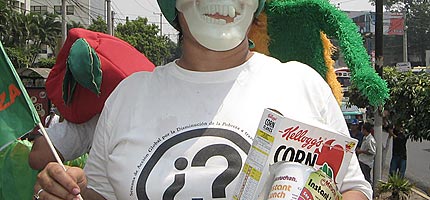© LWF/DWS El Salvador
Christians Must Challenge Unjust Systems That Cause Hunger
For Christians, access to adequate, safe and nutritious food has always been one of the foundations of a just, peaceful and sustainable world. “Give us this day our daily bread” is a petition repeated by millions of Christians around the world every day as they recite the Lord’s Prayer.
“Give Us Today Our Daily Bread,” the theme of the July 2010 Eleventh Assembly of the LWF, continues this petition.
The vision of “daily bread” stands in stark contrast to the reality of today’s world, where nearly one billion people lack adequate food. This brutal injustice is underlined by the fact that we actually produce enough nutritious food to feed everyone in the world.
We live in a broken and sinful world with hunger all around us. Our response as compassionate people of faith is to offer food. Jesus commends those who give food to the hungry, declaring that “just as you did it to one of the least of these who are members of my family, you did it to me (Matthew 25:40).”
In its mission to promote a just, peaceful and sustainable world, the LWF works through its Department for World Service (DWS), which provides emergency response and effective long-term development programs in more than 30 countries. The DWS programs seek to create durable, sustainable conditions which are essential in empowering people to procure their own food and break the chains of dependency.
The LWF undertakes these programs in cooperation with many ecumenical partners around the world in the Action by Churches Together (ACT) International network.
True compassion is more than flinging a coin at a beggar;
It comes to see that an edifice
which produces beggars
needs restructuring.Rev. Dr Martin Luther King, Jr. | US civil rights leader
While providing food in times of want is commendable and necessary, God also demands that we “break the chains of injustice” and “free the oppressed” (Isaiah 58:6).
This prophetic approach requires that we reflect on, critique and act against the systems that lead to pervasive and debilitating hunger. While we provide food to those who are in immediate and dire need, we must also expose and eradicate the causes of hunger, many of which result directly from the actions of “the principalities and powers” (Colossians 2:15).
As Martin Luther wrote in his Large Catechism, “When you mention and pray for daily bread, you pray for everything that is necessary in order to have and enjoy daily bread and, on the other hand, against everything which interferes with it.”
In short: pray for bread, enjoy it and reject all the forces that distort the vision of bread for all. Luther’s comments on the fourth petition of the Lord’s Prayer challenge the easy temptation for Christians in the North: charity without economic justice. He rejects the tendency to provide economic necessities through charity without also identifying and challenging the economic oppression and exploitation that have impoverished the poor.
Since there is enough food in the world to ensure food security for all, we must conclude that hunger is a result of inequitable distribution and injustice. Some certainly have more than they need, while others starve. Our faith condemns such inequity. Whether the cause is greed, historical or environmental causes, or simple ignorance, we cannot tolerate hunger anywhere. Access to adequate and nourishing food is a right for all, not a privilege that only those with sufficient means may enjoy.
The LWF, especially through the advocacy activities of its Office for International Affairs and Human Rights (OIAHR) works to “break the chains of injustice” through international advocacy and to change power structures and relationships. The LWF is involved in advocacy at many levels and in many contexts, from the grassroots, to national and regional efforts, to international and global forums, challenging the economic oppression and exploitation that impoverish the poor.
Now a wide ecumenical movement is mobilizing to confront the root causes of hunger in the world.
Through the Ecumenical Advocacy Alliance (EAA) of which the LWF is a member, Protestant, Roman Catholic and Evangelical churches and organizations are working together in a four-year campaign focused on food. By combining their collective advocacy on several critical issues, EAA members strengthen their voices and actions for justice, and have a greater chance to make a difference in church communities, among policy makers and in business circles.
The campaign launched in May 2009, focuses on the right of all people to adequate food. It looks beyond how food is produced and what is consumed, and includes the unjust and unsustainable policies and practices in today’s food systems. All churches, Christian organizations and individuals can join this campaign to eradicate hunger by working to eliminate unjust systems that jeopardize our harmony with Creation.
Peter Prove | LWF Assistant to the General Secretary for International Affairs and Human Rights
Francesca Traglia | OIAHR Human Rights Accountability Project coordinator
Sarah Speicher | EAA communications consultant

